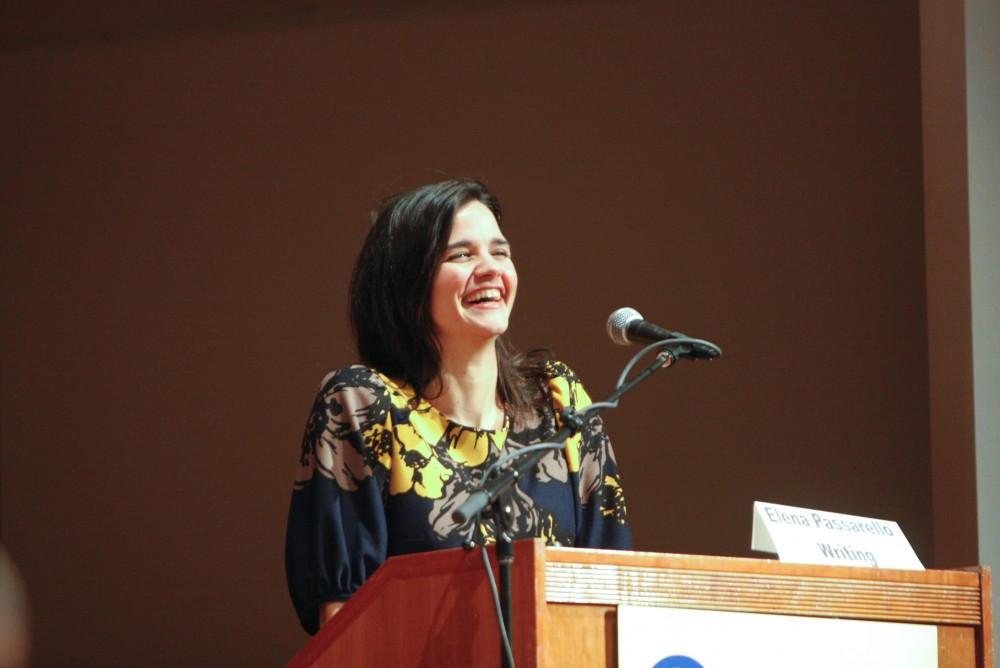‘A Very Fine Piano’ explores advent of auto-tune

GVSU Writing Professor Elena Passellero
Mar 3, 2011
Chances are that when T-Pain first ran his voice through the pitch-correcting audio processor known as Auto-tune, he did not think his catchy, robotic crooning would be the subject of academic study.
Grand Valley State University Writing Professor Elena Passarello analyzes T-Pain, Led Zeppelin frontman Robert Plante and actor Marlon Brando, among others, in her upcoming book about the human voice in performance.
Tentatively titled “A Very Fine Piano,” Passarello’s book is a collection of 15 essays that attempt to understand the social importance of different vocal styles.
“It’s a very artsy book,” Passarello said. “It’s not going to be a nonfiction book that is really, really thick. It’s more like lyric essays that are really heavily researched.”
Sarabande Books, a publishing company in Louisville, Ky., recently bought the rights to “A Very Fine Piano” and set a release deadline of October 2012, although Passarello said the book could hit shelves before then.
Sarah Gorham, president of Sarabande Books, said that her company receives upwards of 4000 manuscripts a year and publishes only 10 or 11.
“Elena’s exploration of voice, its use in performance, its physiology, philosophy, poetry, as well as its place in popular culture, is truly original and magnificently executed,” Gorham said. “It was clear this was something I wasn’t going to lose to some other publisher. It’s entertaining, wise, beautifully written, just our sort of thing.”
As T-Pain can attest, human vocal performances are constantly changing, and it would be impossible for a single book to cover all of aspects of the voice.
Passarello divides her 15 essays in “A Very Fine Piano” into three categories: singing, screaming and noise-making.
In her section on noise making, Passarello writes about Pittsburgh Steelers’ radio broadcaster Myron Cope, whose voice she describes as “the ugliest you’ve ever heard, really gravelly,” adding “it sounds like he ate cigarettes.”
Essays in the screaming section focus on Marlon Brando’s “Stella!” cry from “A Streetcar Named Desire,” Howard Dean’s infamous “Byah!” and the piercing yet culturally iconic Wilhelm Scream.
In her section on singing, Passarello explores, among other things, the cultural impact of Auto-tune, or “vocal air-brushing,” which she blames for that “horrible sound found in every Ke$ha song.”
The main question in her Auto-tune essay asks, “Why don’t we want to hear the natural flaws in people’s voices?”
“If you listen to a Katy Perry song, there are no natural moments in any of it,” she said. “Before we had the physical capablilty to speak, when we were like Lucy the hominid, we could still make noise — we could still roar, still cry. The voice is a natural thing. Why are we so obsessed with songs that don’t allow that? Why don’t we want flawed sound?”
Passarello said that she needs to find an explanation for Auto-tune’s prominence in popular music before her publishing deadline in 2012.
By the time “A Very Fine Piano” arrives in stores, Passarello will have spent more than four years crafting the book.
She first considered analyzing the human voice during her work as a voice-over actor, where she was asked to manipulate her sound to sell products.
“When I was doing voice-overs, I started thinking about the book because I recognized the voice not only as an instrument, but as a communicative device, where if I just change certain sounds over the radio, the listener imagines a completely different person,” she said.
Passarello expanded upon her initial idea while working on her master’s degree at the University of Iowa, eventually making the human voice in performance the topic of her graduate thesis.
Now that a publisher has put the book under contract, Passarello is happy to see a finish line for her project.
“Once folks find out you’re writing about (the human voice), they bring you more and more ideas for more and more essays,” she said. “It’s good to have a point where you have to say, ‘No, I have to stop,’ otherwise this will be a 7,000 page book that no one will want to read.”





















